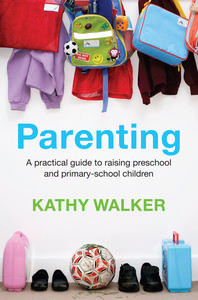The give away has now closed. Thank you for visiting Planning With Kids.
If you have been reading my blog for a little while, you will know that I am a massive fan of Kathy Walker and reference her frequently in my writing. So I have been eagerly awaiting her latest book Parenting: A practical guide to raising preschool and primary-school children.
Sometimes after reading a parenting book, I can come away feeling slightly despondent, worrying about all the things that I could be doing better. After reading Walker’s book, although I clearly see areas for improvement in my parenting skills, I actually feel encouraged to keep trying to be a proactive parent and to taking the best care I can of myself.
The book is divided into four clear parts, the first talks you through examining your parenting style and the personality of your children. The second part focuses on Proactive Parenting:
Proactive means we don’t wait for things to go wrong before we reflect on our parenting strategies, but we try and set up a calm and predictable home environment that minimises opportunities for things to go wrong in the first place.
At the heart of proactive parenting is the idea of acceptance – an appreciation that children need to be treated as children, that there is no such thing as the perfect child or the perfect parent, and that there will be ups and downs.
Through out the chapters in this part, Walker looks at the areas of daily family life like sibling rivalry, friendships, school, possessions like iPods, mobile phones etc and children’s chores and offers insights in how to be proactive.
With 5 children in our family, I found the chapter on sibling rivalry very insightful. It made me realise that the bickering and antagonising that goes on in my house at times is to be expected and doesn’t mean that I am failing as a parent. What I can improve upon though is to avoid intervening as much and not allowing myself to become the umpire.
It is important to avoid this, as it not only robs the children of the opportunity to learn skills such as negotiation and self calming, but it also makes it hard for you to remain neutral. You can make statements like, ‘I know you want me to sort this out but it is your issue and I believe you two can sort it out yourselves.’
Part three is Troubleshooting and is the section that I will be referring back to again and again. I loved the logical structure of this part. Walker first takes you through her Five-point Positive Parent Preparation Plan. This plan is incredibly helpful in preventing parents from jumping into issues with the kids without first thinking it through.
From there we are then given the Top 10 behavioural strategies that will help parents maintain a calm and safe home life. The detailed explanation of consequences vs punishment is excellent and gives you examples of what to try with your kids and what to give a miss. Walker also collates what she feels are the “most damaging strategies” as a reminder of ones which we should avoid as a parent like hitting, labeling or bribing children.
Troubleshooting also includes case studies of common parenting issues and breaks them down into sections, looking at why the problem may be happening and what you can do to remedy it. The key points that Walker lists at the start of the case studies, sums up the overriding philosophy of the book:
- All behaviour has meaning.
- There are very few quick fixes.
- If you can stay calm, you’re halfway there.
- Your children don’t have to be perfect.
- You don’t have to be perfect.
The final part of the book is “Looking After Yourself” and to me highlights the balance that Walker achieves in Parenting. Throughout her advice in the book, her approach to children is respectful, but she also acknowledges the rights and needs of the parents. Walker very much understands that parenting in the 21st century whilst full of love and joy can also be challenging and frustrating. So as parents she strongly advocates that we take good care of ourselves emotionally and physically.
In order to give out to our children – to model the resilience and emotional intelligence we want them to learn – we first need to feel reasonably strong, happy and fulfilled. We have to have something in order to give it.
For me Parenting fills the gap in my parenting books. I have Children Are People Too to reference for my little ones and I have He’ll Be Okay; Growing Gorgeous Boys Into Good Men for my soon to be adolescent, but I really didn’t have any book aimed at my school aged children. Given that we have had some challenging issues with the school aged kids of late, I am glad to now have this book as part of library :).
Give Away
Courtesy of the lovely folk at Penguin, I have one copy of Parenting to give away. The give away is open to Australian residents and entries must be received before midday Friday 26th March 2010 AEDT. The winner will be chosen randomly and announced on the blog later that day.

